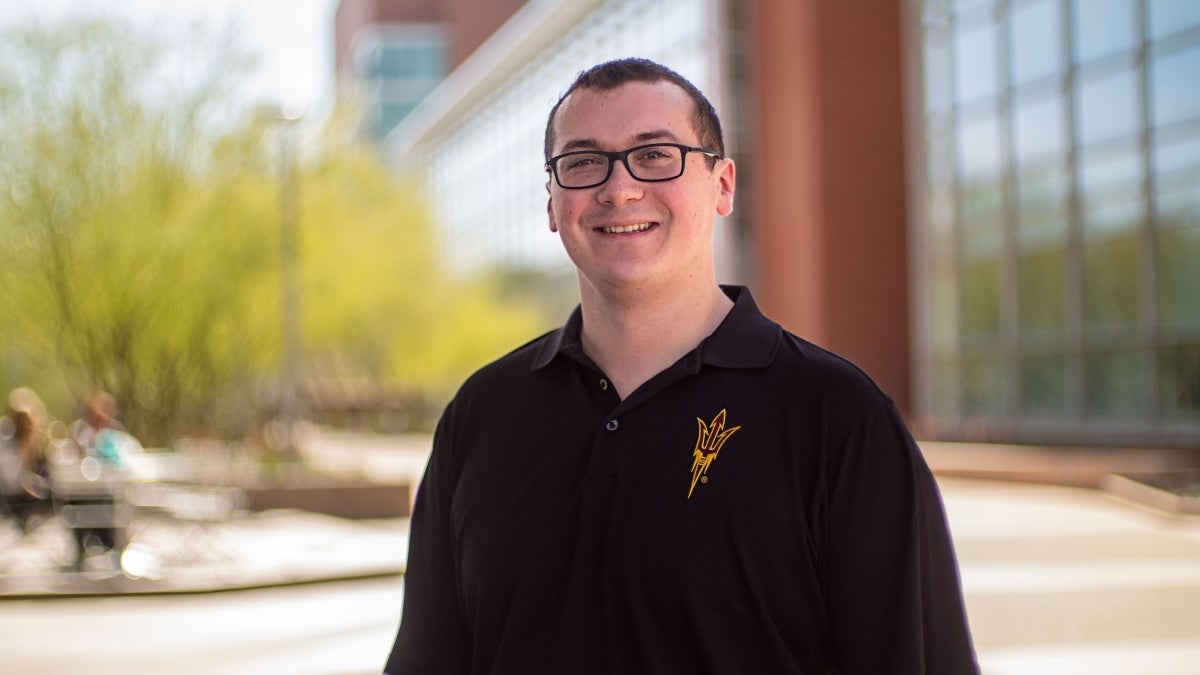Where and with whom you drink matters

Jack Waddell, a first-year graduate student who was recently acknowledged by the Research Society on Alcoholism as an RSA Memorial Award winner. Photo by Robert Ewing
Drinking alcohol alone can be a warning sign of alcohol abuse. But drinking in stimulating group environments can put people at risk for engaging in behaviors that have acute consequences like aggression or risky sexual behavior.
Given potential effects of the drinking environment, researchers in the Arizona State University Department of Psychology are trying to understand whether the context of where and when people drink alters how they respond to alcohol. The experiments take place in the Behavioral Alcohol Research for Clinical Advancement (BARCA) lab, led by William Corbin, professor of psychology.
Jack Waddell is a first-year graduate student in Corbin’s lab, and he was recently acknowledged by the Research Society on Alcoholism as an RSA Memorial Award winner. The award, given for the first time this year, recognizes promising alcohol researchers in honor of those researchers who have passed away.
“It is just so validating to receive this award as a first-year graduate student,” Waddell said. “It means my peers see potential in my work.”
It is uncommon for first-year graduate students to present work at a symposium, let alone be selected for research awards. At the Research Society on Alcoholism meeting, Waddell was one of two graduate students honored. The other was an upper-year graduate student from Memphis.
“Jack has been incredibly productive for a first-year graduate student. He already has two papers under review and defended his Master's prospectus before the end of his first year,” said Corbin, who presented Waddell with the award at the RSA conference. “Given Jack’s early trajectory, I think the sky is the limit for what he will do.”
At the annual meeting of the Research Society on Alcoholism, Waddell presented findings about how the context of when and where people drink affects how they experience alcohol effects.
“We want to help people understand how a social environment impacts drinking behavior,” Waddell said.
Most research on how people consume alcohol is confined to a lab setting and usually involves one person. The experiments in the BARCA lab are different: they are similar to what people would experiment on a night out.
To study the effect of a social environment on alcohol consumption, Waddell looked at how aroused or alert people were and whether they were in a positive or negative mood. When people drank in a social setting, they became more positive, sociable and outgoing. But they also became more aggressive, rude, and demanding.
In addition to his research on alcohol consumption, Waddell has served as a valuable contributor to the new Online Addiction and Substance-Use Related Disorders Graduate Certificate offered through the ASU Department of Psychology.
Related: Combating the opioid crisis with better equipped counselors
“Jack helped support the development of the graduate certificate program, which also gave him exposure to the required knowledge- and skills-based competencies needed in addictions treatment. He will begin applying these skills this fall at the Clinical Psychology Center, where he will be providing alcohol screening and intervention services for the ASU Alcohol Diversion Program,” said Matthew Meier, assistant clinical professor and director of the certificate program.
More Science and technology

Indigenous geneticists build unprecedented research community at ASU
When Krystal Tsosie (Diné) was an undergraduate at Arizona State University, there were no Indigenous faculty she could look to…

Pioneering professor of cultural evolution pens essays for leading academic journals
When Robert Boyd wrote his 1985 book “Culture and the Evolutionary Process,” cultural evolution was not considered a true…

Lucy's lasting legacy: Donald Johanson reflects on the discovery of a lifetime
Fifty years ago, in the dusty hills of Hadar, Ethiopia, a young paleoanthropologist, Donald Johanson, discovered what would…